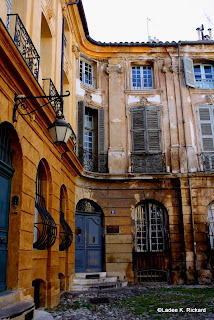The first map
shows our detailed map and the second one shows our entire walking tour of the
city. The "medieval section" along the walking route from #3 to
#4 is covered in multiple posts. The order that you read the posts is not
important unless you are looking at the street locations.
We crossed Cours Mirabeau and walked past "Les Deux Garcons". I didn't know this at the time, but this was a legendary brasserie known informally as the 2Gs. Paul Cezanne used to come here and enjoy a three hour aperitif (from 4PM - 7PM!) with friend Emile Zola and others.Very many other famous names have downed a glass here too, including Picasso, Churchill, Mistangett, Edith Piaf, André Malraux, Jean-Paul Sartre, Raimu, Alain Delon, Jean-Paul Belmondo and Jean Cocteau. I will make it a point to stop here on my next visit!
We passed Fontaine de l'eau Chaude (Fountain of Hot Water). It is a strange looking fountain was built in 1731 and uses water from a hot spring. It is covered in moss. As people walked past it, they would lean over and touch the water.
We passed Fontaine de l'eau Chaude (Fountain of Hot Water). It is a strange looking fountain was built in 1731 and uses water from a hot spring. It is covered in moss. As people walked past it, they would lean over and touch the water.
Moving on, the old look of the city starts to show as soon as we enter the area. We started north on Rue Fabrot.
Several of the street corners have statues high on the wall.
I liked the stenciled letters on the exterior wall.
This city has a fountain every time that you turn a corner. This little plaza and fountain are located at the end of Rue Fabrot. We walked through here, then turned left on Rue Esperiat.
Street signs help to point you in the right direction through these winding streets.
We soon came to the Museum of Natural History. We didn't go in. It is in a "charming" mansion.
On one side of the courtyard are two windows with unique and interesting iron balcony railings. The tour guide indicated that business owners could not display signs for business that dealt with "pleasure", so indicated (through the design in the railing) what could be found inside.
This old wooden door is beautiful, even though it is in need of a little repair.
A very short walk on Rue Espariat brings you to a very cute courtyard of Place d'Albertas. It is blocked off from parking, has a delightful fountain, and shows a great example of the changes that can occur when buildings are refurbished and repaired. The Fontaine d'Albertas (Fountain of Albertas) was built two centuries after the hotel of the same name. It was rebuilt in 1912 by the pupils of l'Ecole des Arts et Métiers d'Aix (School of the Arts and Trades of Aix), with a cast iron cauldron.
One of the three enclosed sides has been fixed and painted. This is the "after" photo. This must be recently finished because the googlemaps view shows scaffolding in front of this building.
To the right of the building is an unfinished section. What a difference!
You can see the before and after, side by side.
The cobblestone in the area is cute too.
At this point, we turned right on Rue Aude to continue the tour. (Continue to Part 2)

















I don't think I'll ever look at iron work on a balcony quite the same again!
ReplyDeleteI really enjoyed seeing the side by side restoration work on the one building - thanks!